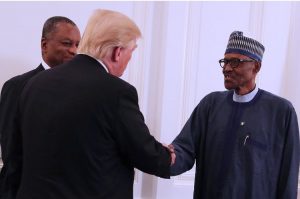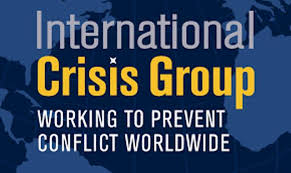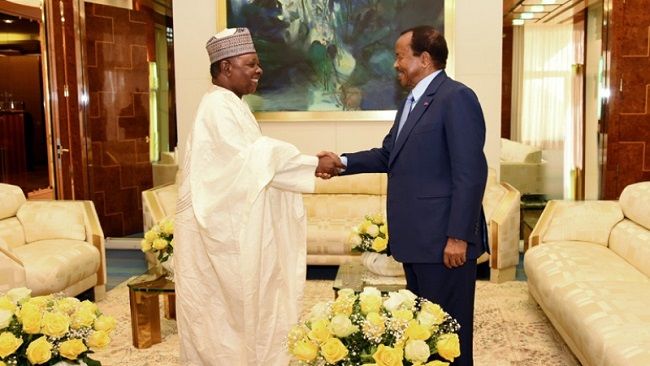A Yaoundé based think tank is cautioning Nigeria on implications for internal security in Nigeria and Cameroon as well as bilateral relations from the handling of Cameroonian separatists being held in the country. Pro-separatist militancy in Anglophone Cameroon could heighten just as the degree of radicalisation and large concentration of Anglophone diaspora with resources in Nigeria could throw up an insurrectionist group using Nigeria as a rear base for armed struggle, says the think tank in an eight page Brief intended for the human rights community in Nigeria now in circulation.

President Buhari and Foreign Affairs Minister, Godfrey Onyeama on a global stage but with what leverage for Nigeria on an unfolding threat?
The caution raises questions as to the prospects of Nigeria deftly walking the tight rope of a relation between it and her nieghbour, the Republic of Cameroon, on the issue of a secessionist insurgency contesting the Cameroonian State. The fact of contiguity alone dictates that the two countries are their brother’s keeper even in the best of times. It is even more necessary now in a world in which the distinction between the inside and the outside is blurring to the point of disappearing. But it is a relationship that has had its own share of tense moments and which could get more tense depending on how Nigeria moves in relation to recent internal political crisis in her nieghbour’s homestead. Currently, there are about 50 Cameroonian separatists arrested and currently in detention in Nigeria.
The think tank is, therefore, suggesting a number of options for Nigeria. Among these are the relocation of the detainees to third States of asylum, given the possible implications of their presence in Nigeria for Cameroon-Nigeria relations. This is argued as a way of allowing space for resolution of Cameroon’s internal matters; paying attention to refugee outflows and caseload into Nigeria from the Cameroon Anglophone crisis, particularly into Cross River, Benue, and Taraba States; ensuring adequate monitoring of border areas by Nigerian authorities in order to prevent recruitment, training, and cross-border incursions into Cameroon by pro-separatist groups.
Others are for Nigeria to reiterate the position of world leaders that Cameroonian Government address the grievances by the Anglophone minority, especially through an inclusive dialogue; ensuring that due legal process is followed in handling the detainees’ case, including if extradition proceedings are pursued. Backgrounding this option, the Brief makes reference to how the alleged offences of the separatist groups are crimes against State security (sedition, insurrection, secession) as well as terrorism and armed activity, all of which would be tried in Military Tribunals and, finally, confirming their arrest, their conditions of detention, access to legal representation and to their next of kin or families. This is defended in terms of constitutional rights and rights under international human rights law, all to which Nigeria is a party, particularly the U.N. Convention Against Enforced Disappearances.
According to the brief, 10 cadres of the separatist forces, including a Professor and several lawyers were arrested by an unnamed Nigerian security outfit early in January. This has been followed by another batch of 40 arrested specifically by the Nigerian police. It is expected that Cameroon would insist on their extradition.
Cameroon has erupted in civil disobedience, mass demonstrations and other disruptive activities in the past two years as the English speaking part of the Republic stepped up agitations for own nation state of Ambazonia, claiming mistreatment and exclusion by the French speaking part. The separatist elements are complaining of imposition of French speaking teachers in the educational sector and French speaking judicial officers in a predominantly English speaking zone, inadequate representation at the centre and disempowerment. The government of Cameroon has acknowledged these complaints but understandably declared the unity of the country as non-negotiable.
 International crisis management NGOs such as the International Crisis Group which has done elaborate documentation on the conflict, particularly its December 2017 report titled “Cameroon’s Anglophone Crisis: Dialogue Remains the Only Viable Solutions” detailed how the conflict went to the African Commission on Human and People’s Rights and which gave its position in 2009. While the commission granted the separatists the right to self-determination, it defined that right strictly in terms of better constitutional, political and governance terms. In other words, it ruled out secession on the ground that the threshold of human rights violations that would have justified that could not be seen. The commission went further to ask the Cameroonian government to enter into dialogue while the armed groups fighting for independent Republic of Ambazonia would transform into political parties within the context of Cameroonian politics.
International crisis management NGOs such as the International Crisis Group which has done elaborate documentation on the conflict, particularly its December 2017 report titled “Cameroon’s Anglophone Crisis: Dialogue Remains the Only Viable Solutions” detailed how the conflict went to the African Commission on Human and People’s Rights and which gave its position in 2009. While the commission granted the separatists the right to self-determination, it defined that right strictly in terms of better constitutional, political and governance terms. In other words, it ruled out secession on the ground that the threshold of human rights violations that would have justified that could not be seen. The commission went further to ask the Cameroonian government to enter into dialogue while the armed groups fighting for independent Republic of Ambazonia would transform into political parties within the context of Cameroonian politics.
That seemed the most pragmatic settlement and win-win enough for both parties, especially that the commission ruled that there had, indeed, been violation of denial of the right to use English in everyday transactions such as registering a business, right to life; right to fair trial, especially before junta tribunals and provable cases of relocation of strategic state enterprises away from the Anglophone areas as complained of by the separatists. In spite of this reasonable judgment, the conflict degenerated rapidly to a point where regrouping of fighters was reported in locations near Nigeria and the Cameroon border in November and then commencement of sporadic attacks against Cameroonian security forces in December 2017. Naturally, the Cameroonian State responded typically: military crackdown.
In fact, ICG’s report specifically stated how Cameroonian defence and security forces suppressed the protests staged from 22 September to 1 October 2017 and to which the separatist factions responded by taking harder line and attracting more support. It named the Manyu division in the Southwest as the hotbed of the insurrection because of its proximity to Nigeria’s Cross River state, home to some of the officials of the “Federal Republic of Ambazonia” (the name given by secessionists to their self-proclaimed state).
In the words of the report, “This hypothetical republic is formed by five groups: Southern Cameroons Ambazonia Consortium United Front (SCACUF), Movement for the Restoration and Independence of Southern Cameroons (MORISC), Southern Cameroons National Council (SCNC), Southern Cameroons Youth League (SCYL), and Southern Cameroons People Organization (SOCAPO). Ambazonia has a flag and an anthem”.
It went further to claim that: On 30 October, the separatists held a meeting in the Nigerian city of Abuja, and then adopted the constitution of Ambazonia. In November, the interim president of Ambozonia, Sisiku Julius Ayuk Tabe, followed this up by forming a fifteen-member “interim government”, without revealing the identity of the defence minister. The Ambazonia Governing Council (AGC), led by Lucas Cho Ayaba, and on which the Ambazonia Defence Forces (ADF) depends, is not part of this interim government”.
 However, ICG’s report categorically exonerated “the government of neighbouring Nigeria” which it said has not got involved in the crisis. Nigeria, said ICG, has its own grounds for being wary of the Anglophone protest movement although some inhabitants of South-eastern Nigeria are said to sympathise with Cameroonian Anglophone activists, as lean as the support is estimated to be. But, what has been Nigeria’s diplomacy so far? Nigeria’s ambassador to Cameroon, Lawan Abba Gashagar, has been reported to have meet President Paul Biya early last December during which he said Nigeria does not support secession anywhere.
However, ICG’s report categorically exonerated “the government of neighbouring Nigeria” which it said has not got involved in the crisis. Nigeria, said ICG, has its own grounds for being wary of the Anglophone protest movement although some inhabitants of South-eastern Nigeria are said to sympathise with Cameroonian Anglophone activists, as lean as the support is estimated to be. But, what has been Nigeria’s diplomacy so far? Nigeria’s ambassador to Cameroon, Lawan Abba Gashagar, has been reported to have meet President Paul Biya early last December during which he said Nigeria does not support secession anywhere.
Except for the U.S., Cameroon’s Western partners, such as France, the UK, Germany, Canada and the EU have not made any public statement because, in the words of the report, they are exercising discreet diplomatic pressure on Yaoundé. It is argued that private diplomacy is still the best but ICG puts this to the estimation that the conflict has little or no contagion effect potentials. This is contradictory to the warnings contained also in the report that unless a political dialogue begins soon, Cameroon could find itself facing an increasingly delicate economic and security situation in 2018, a situation the country does not look good fit to face, having regard to how it is already confronted with Boko Haram in the Far North and militia from the Central African Republic in the East. Meanwhile, it is scheduled to hold presidential and parliamentary elections later this year.
With the Anglophone crisis in Cameroon, Africa confronts its colonial past defined by the compacting of the nation state with identities that perceive inter-group incompatibility. The situation is worsened by the post Cold War context and the search for fulfilment in discourses of ancient identities away from the post colonial state that it created by discourses of identities promoted by scholars such as Samuel Huntington. Instead of uniting and strengthening the post colonial state as it alone can negotiate any concessions at all for poverty stricken and merely juridical states from an exploitative international order, African cultural groups seek to pull away from the state. As such, they lose, head or tail, especially as the typical African national elite knows no more than resort to military crackdown in negotiating accommodation. In the end, it is refugee camps all over the continent as the Kalashnikov and its sellers smile to the banks.
Trouble in Cameroon is trouble in Nigeria because no border guards will prevent influx of not just human beings but more guns. What is to be done? West Africa needs peace.




























